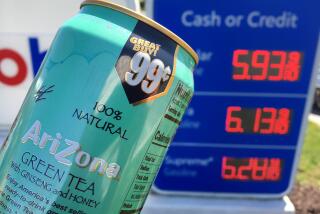Coke, Pepsi Wage Glitzy Battle in Brazil
- Share via
RIO DE JANEIRO — Tina Turner’s legs, Sting’s bare chest, thousands of nearly nude samba dancers and millions of screw-on bottle tops are weapons in a big-bucks soft drink “war” raging furiously in Brazil.
The world’s premier cola companies, Coca-Cola Co. and Pepsico Inc., are battling for position in a market third only to the United States and Mexico. By the end of the century, thirsty Brazil should be the world’s second-largest soft-drink market, worth $2.5 billion a year.
“Sure it’s a war, to win market leadership,” Pepsi’s president in Brazil, Luis Suarez, 40, said.
To make his point, Suarez, an ebullient Peruvian, donned olive-green camouflage and greased his face black at one sales rally last year.
“We’re like commandos,” he said. “We’re smaller (than Coke) but we’re highly trained and highly motivated.”
Coca-Cola pooh-poohed the idea of a war.
‘Paranoid’
“Pepsi is way behind us and has been for years,” Coke’s vice president in Brazil, Ray de Lagrave, said. “They’re just trying to legitimize their presence by tying their image to Coke, pretending the two companies are equal.
“But I guess if you’re small you worry about small things, like calling it a cola war,” he said. “Sometimes Pepsi seems paranoid.”
“Paranoid?” laughed Suarez. “If growing and stealing their market is paranoid then yes, I guess we are.”
Certainly it’s a tense battle, fought behind the scenes with bottling plants and out front with wounding words. Front-line soldiers include Turner for Pepsi and Sting for Coke, big names in a country that receives few top international rock stars.
Each recently packed more than 100,000 fans into Rio’s Maracana soccer stadium, the world’s largest, and at the same time appeared in ads that reinforced their association with their respective cola product and Brazil.
Turner rode to the stage on a carnival float, to the beat of samba drums. Sting sang in Portuguese.
Newspapers hyped the concerts with photo layouts of Turner’s legs and of Sting visiting an Indian reservation, daubed in body paint.
Conflicting Images
Pepsi bigwigs gritted their teeth as fans of the singer they’d hired quenched their thirst with Coke--it holds an exclusive franchise on stadium sales. Pepsi operators had to cover the permanent Coke billboards in the stadium.
But then Sting, despite a lucrative sales contract with Coke, was seen holding a Pepsi.
“Someone stuck it in his hand, but he didn’t drink it, really,” a Coke executive explained.
Pepsi has a long way to go. Coke arrived in Brazil in 1942. By last November, it claimed 84% of the $750-million-a-year cola market, thanks to 76 franchised bottling plants hitting 98% of all soft drink outlets. Another 12 plants will open this year.
Pepsi has been in Brazil almost as long as Coke. It never got beyond a foothold in some smaller cities until three years ago, when it joined forces with Brahma, Brazil’s biggest beer company. Brahma’s slick production and distribution enabled Pepsi to get its cans and bottles to consumers in the major cities.
Now Pepsi is concentrating on persuading loyal Coke drinkers to switch, targeting one-fourth of the population aged 10 to 20.
That means rock ‘n’ roll, rock ‘n’ roll, and more rock ‘n’ roll, and a new youthful: “Taste of the new generation.” Pepsi also is sponsoring local musicians.
“Every teen-ager has a friend who plays in a rock band,” Pepsi’s marketing director Antonio Kriegel said.
More to Read
Sign up for Essential California
The most important California stories and recommendations in your inbox every morning.
You may occasionally receive promotional content from the Los Angeles Times.













